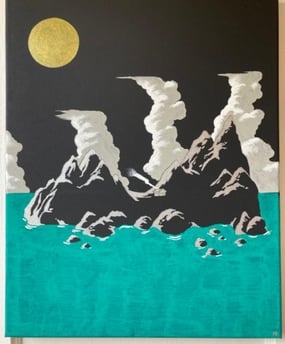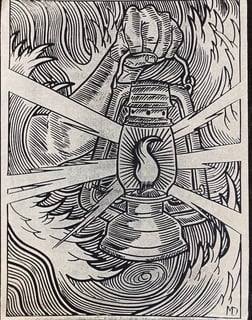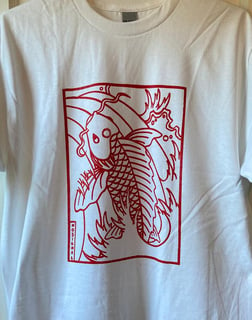Tending to the Fire with Matt Denes
Artist interview with Matt Denes, an artist, drummer, dancer, and poet based out of Tallahassee, Florida, talking about the creative process, listening to yourself, and breaking the rules.
COMMUNITYDIYHUSTLING


MP: How would you describe your art?
M: I would say it's ever-changing and cinematic. It's very difficult for me to stay on one thing for too long with my work, maybe a couple months tops. It's not that I get bored with it, but rather me avoiding the possibility of getting bored with it, like listening to a certain rock band religiously and then one day putting it down and saying "OK, let's not wear it out" and move on and circle back around later. When I say 'cinematic' that's usually in regards to the composition. Whatever media I'm working in at the time, sometimes the aesthetic composition and dynamics are more important than the meaning, and sometimes the opposite is true. I love film and especially well-shot films. If I can make a piece of art that feels like a freeze frame of a film, or a perfectly balanced totem of elements and color, then I've succeeded.
MP: How long have you been doing your art thing?
M: I have solid memories of drawing as far back as first grade, though it likely started before that. Drawing was my primary medium all the way through high school, and that slowly gave away to painting, then sculpture, then costume, then performance, then film, and then just about anything after that. professionally speaking I've only been doing it for a couple years and it's been a wonderful experience. As a kid, wanting to be an artist when I "grew up" was usually met with an "aw that's cute", like I was expected to snap out of it and be a lawyer at some point.
MP: How did you find inspiration for your artwork? Especially with working in several different mediums.
M: Music is big for me, especially if it creates images in my head. If that happens nowadays I usually think "can I film this image and make it real?" And if the answer is no then it becomes a painting or a print or some thing else entirely. I have plenty to say but I often feel stuck finding the right outlet to get it out properly. It's one thing to have a great idea, it can be extremely disheartening if it's not executed properly and with care. Certain themes and ideas are sometimes reserved only for certain medium, for example my printmaking has a lot of social commentary to it, without being too obvious about it. Painting can be very immediate and more about a feeling I'm having or an abstract regurgitation of some thing that has no words to describe it. But I'm usually very reserved in describing what my work is actually about. Not that I want to be standoffish or secretive, but it's important for people to see themselves in my work and find out what it means to them, not like an equation, but a mirror. Artistically speaking its a tale as old as time, but it's one I subscribe to very much.
MP: What has your experience been like with building networks on social media? What are the challenges social media poses with this? And what are the rewards?
M: Right now I'd say social media is ever evolving and generally a mess with such things. As recent as two or three years ago the platforms of Facebook and Instagram were THE go-to outlets for sharing one's art, following artists you admire and having others follow you. I think any networks built around that time are very strong and have only gotten stronger since.
Many of the artists I follow and admire really started branching out during the beginning of Covid and lockdown. Some of them had never done it professionally but were home and missing work and needed money, so they opened up shop. Though in the times since then I can't help but feel like there's this ever tightening a noose on all that in favor of paid promotions and algorhythmic favoritism. Most artists aren't even seen by more than 10% of their followers, and that number only goes down the more followers they get. It's as though they were given everything, it was taken away, and now they want you to pay to get it back.
Nowadays I would say the best way to network is in person, going to meet ups with other artists, exhibit openings and entering into shows and competitions. Social media, to me, cannot be relied upon nearly as much as it used to be for networking, they're still leg work to do that may seem daunting but it's extremely rewarding.




MP: Do you ever feel burned out from the creative process or the process of having to put your work out there? If so, what do you do to bounce back?
M: If the creative process feels like a fire then it's very difficult to not listen to it and make a lot of work, sometimes in a very short amount of time. If it feels as though there is a very small fire that requires constant tending, then it may be time to take a break and, at times, force yourself to rest. It's important to listen to yourself and be honest. Exhaustion and injury are very real in making art and I know that firsthand many times. In the moment it can feel very romantic and classical to suffer for your art, but it isn't.
Getting art into the public eye is a completely different ball game, for reasons mentioned above as well as how different it is of a process. You have to sort of be your own agent and be willing to take on publicizing it as a separate job completely, and it is a balancing act. If you spend two days on a painting and then two weeks on posting it to every social media outlet you can and achieving as many views and likes and follows then something isn't adding up, and many's a time I myself have had to step back and remember why I'm making art in the first place. So whether it's creating it or telling people about it, it needs to be moderated, like just about everything.
MP: Do you have any advice on selling original paintings/works of art to those ust getting started?
M: If you're only selling originals they will likely be more expensive and it might be more difficult to sell at first. Making prints of your originals can be an expensive process as well that may not pay off at all. I would say to just stand by your prices and be prepared for people to look at your work with an extremely vulnerable disposition in regards to its "worth". As the artist you get to decide the cost and you are the boss. Don't sell yourself short because stuff isn't selling or because you have had a bad experience with someone criticizing your prices. That will inherently always happen, whether it's too cheap or too expensive. The best way to sell art is to make strong art, and have a growing, ever-varying and loyal following. People who will share your work with others and spread your reach out of that loyalty and love for it. It won't happen overnight but if you focus on making good art first and foremost then people WILL find it.
MP: What's one important lesson you've learned from your creative outlet(s)?
M: Rules are bogus. Do whatever you want with your art and neglect anything classical or traditional that is dictated to your creative process. Many artists I have spoken to who are extremely self-conscious about their work are usually bogged down by the classical and traditional, and it's only when they have shed these restraints that they make some of the best work they've ever made, and it only goes from there. Have your influences, learn what you want, and focus on you first and foremost, everything else is secondary or entirely irrelevant.
MP: Any other closing thoughts or things you wanna say?
M: I am extremely grateful to be approached for an interview like this, it's the first I've ever done of any sort. I'm far less eloquent with words in person so this is definitely the best way to get my thoughts out on topics like this. I'm very passionate about all of this and I'm only honored to give my two cents. Thanks for having me.
And thank you, Matt, for participating in the Artist Talk series! I highly encourage y'all to check out their work in the links below, give them a follow on the socials. When Matt filled out this interview earlier this year, I've seen his work continue to evolve and grow, and it's always a delight to see.
Instagram: https://www.instagram.com/nosignalpictures/
Big Cartel: https://nosignalpictures.bigcartel.com
